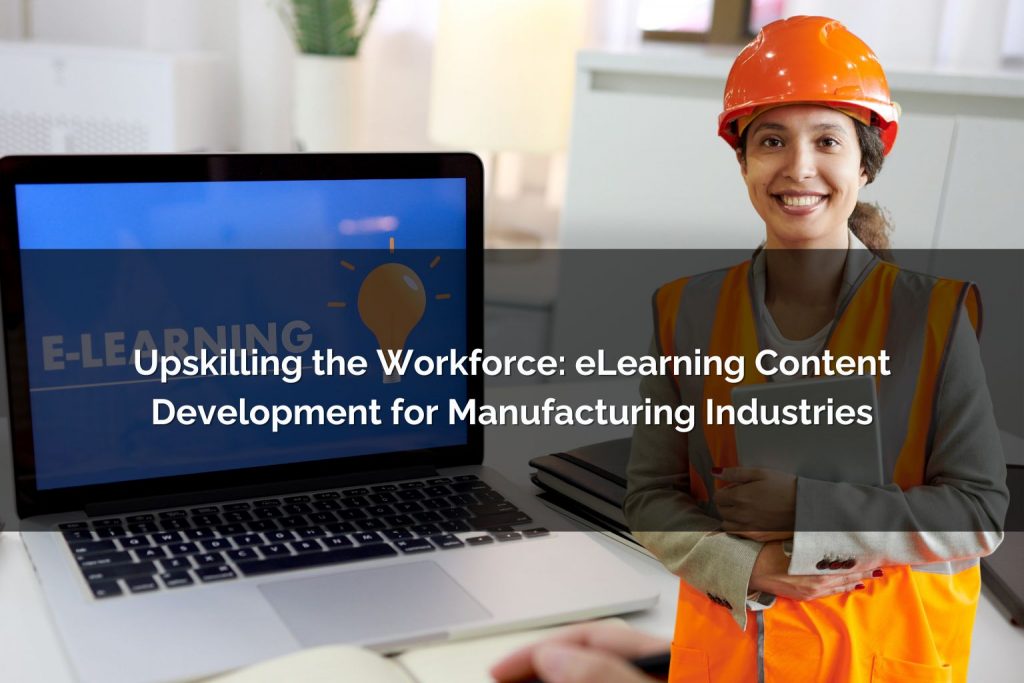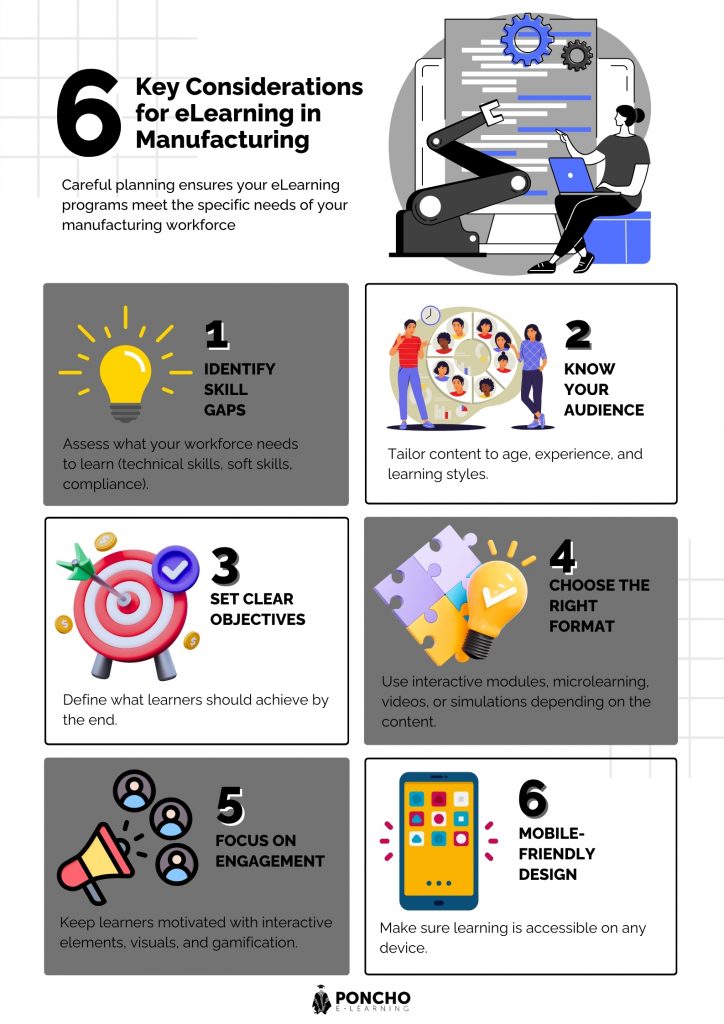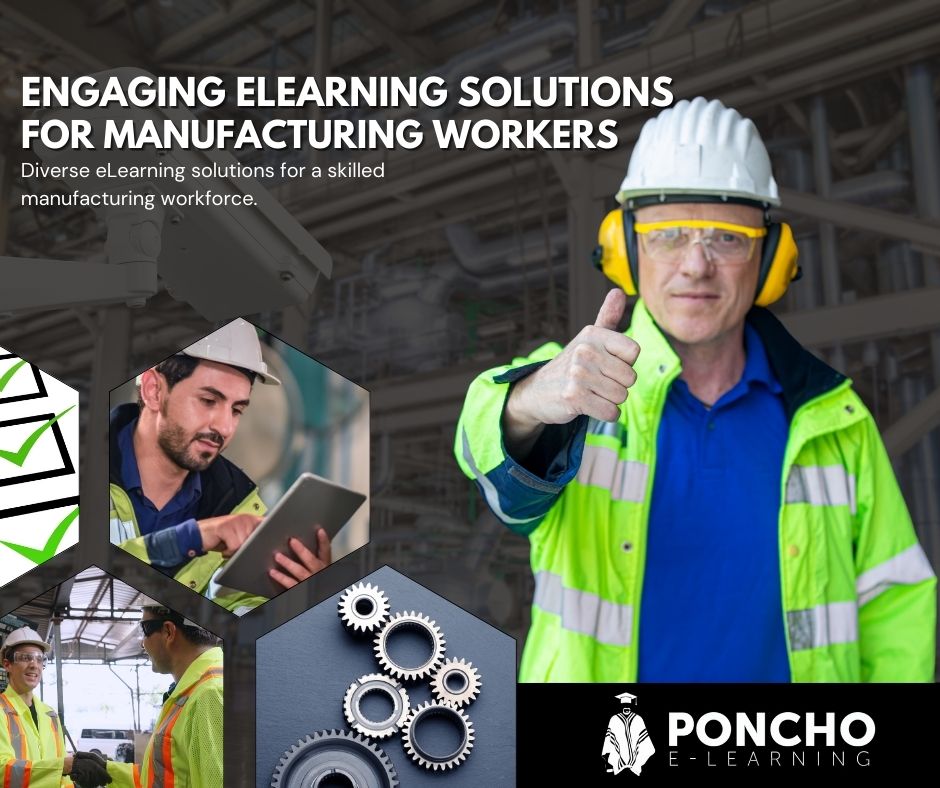The Australian manufacturing industry is undergoing a significant transformation, driven by automation, digitalisation, and evolving customer demands. To remain competitive in this dynamic landscape, manufacturers must invest in eLearning content development for manufacturing industries, empowering their workforce with the necessary skills and knowledge.

This article explores how eLearning content development can be effectively utilised to upskill the manufacturing workforce and equip them for the challenges and opportunities of the future. We’ll delve into the benefits of eLearning in manufacturing, explore key considerations for developing engaging content, and showcase examples of successful eLearning implementations.
Why eLearning for Manufacturing?
Traditional training methods, like classroom sessions, can be time-consuming, expensive, and disruptive to production schedules. In contrast, eLearning content development for manufacturing industries offers several advantages:
- Flexibility: Learners can access training anytime, anywhere, on any device, allowing for self-paced learning and accommodating diverse schedules.
- Scalability: Training modules can be easily updated and rolled out to a large workforce geographically dispersed across different locations.
- Cost-effectiveness: eLearning eliminates travel and venue costs associated with traditional training, offering long-term cost savings.
- Engagement: Interactive elements, simulations, and multimedia content can create engaging learning experiences, fostering knowledge retention and motivation.
- Consistency: eLearning ensures all employees receive the same high-quality training, regardless of their location or trainer.
Key Considerations for eLearning Content Development in Manufacturing

Developing successful eLearning content development for manufacturing industries requires careful planning and attention to detail. Unlocking successful eLearning in manufacturing requires careful attention to these key considerations:
- Identify skill needs: Conduct thorough needs assessments to identify the specific skills and knowledge gaps your workforce needs to address. This could include technical skills related to new equipment operation, soft skills like communication and teamwork, or compliance training for safety protocols.
- Know your audience: Tailor the content to the specific learning styles and preferences of your target audience. Consider factors like age, experience level, and technical literacy when designing content complexity and delivery methods.
- Set clear learning objectives: Define what you want learners to achieve by the end of the training program. This helps ensure the content is focused, relevant, and effectively measures learning outcomes.
- Choose the right format: Consider various eLearning formats like interactive modules, microlearning, video tutorials, and simulations to match the learning objectives and content complexity.
- Focus on engagement: Make the learning experience engaging by incorporating interactive elements, case studies, gamified elements, and clear visuals to maintain learner motivation and knowledge retention.
- Mobile-friendly design: Ensure your eLearning content is accessible and optimised for viewing on various devices, including smartphones and tablets, allowing for on-the-go learning.
Examples of eLearning Content for Manufacturing Industries

Here are some examples of eLearning content development for manufacturing industries that can be implemented:
- Safety training: Interactive modules with simulations and quizzes can train employees on safety procedures, hazard identification, and emergency response protocols.
- Equipment operation: Video tutorials can demonstrate how to operate and maintain new equipment, troubleshoot common issues, and ensure proper use for optimal efficiency and safety.
- Quality control: Interactive modules with case studies can train employees on quality control procedures, identify common defects, and ensure consistent product quality.
- Soft skills development: eLearning modules can enhance communication skills, conflict resolution techniques, and teamwork strategies, fostering a positive working environment and improved collaboration.
- Compliance training: Online modules can educate employees on relevant regulations and industry standards, ensuring compliance with legal requirements and ethical practices.
Embracing the Future of Manufacturing Workforce Development with eLearning
By leveraging eLearning content development for manufacturing industries, manufacturers can equip their workforce with the skills and knowledge needed to thrive in the ever-evolving industrial landscape. By incorporating the key factors and examples outlined above, you can create engaging and effective eLearning programs that empower your employees, enhance productivity, and contribute to the overall success of your manufacturing operations.
Investing in eLearning content development for manufacturing industries is not just about keeping up with the times; it’s about investing in the future of your workforce and ensuring your business remains competitive in a dynamic and demanding environment.




